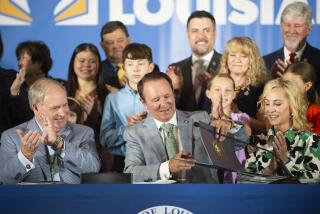Supreme Court appears ready to break down a church-state barrier in certain circumstances
- Share via
Reporting from Washington — The Supreme Court on Wednesday appeared ready to break down at least part of the longstanding church-state barrier that has prevented religious schools from receiving public funds.
The justices gave a skeptical hearing to a Missouri lawyer who was defending the state’s decision to reject a grant request from a Lutheran preschool seeking to participate in a state program that provides money to schools to rubberize the surface of their playgrounds.
Missouri’s constitution, like those in at least 36 other states, bars sending tax money to churches and church schools.
But most of the justices signaled they will rule for the church on the grounds that the refusal to fund the playground amounts to unconstitutional discrimination based on religion.
The justices did not sound sharply split along the usual conservative and liberal lines. Seven of them — all but Justices Sonia Sotomayor and Ruth Bader Ginsburg—spoke in favor of the church’s position.
Justice Stephen G. Breyer said cities routinely provide police protection for churches, send firefighters if a religious building catches fire and dispatch crossing guards at busy corners near a church school. If so, he said, why can Missouri “deny money for helping children not fall in the playground, cut their knees, get tetanus [or] break a leg?” If the money is spent for “health and safety,” church schools should be allowed to seek their share, he added.
Justice Elena Kagan said she was troubled by what she saw as the state’s discrimination against religion. “Essentially this is a program open to everyone,” yet the preschool was rejected for the playground funds just because it was run by a church. She said that appears to violate “a pretty strong principle in our constitutional law” against discrimination based on religion.
New Justice Neil M. Gorsuch, whose recent arrival restored the court’s conservative majority, was quiet through most of the hour, except to agree with the others that the state’s decision was “discrimination on the basis of status of religion…. We know that’s happened in this case, right?” he told James Layton, the state’s lawyer.
What was unclear from the argument was whether the justices would rule broadly in favor of church schools or focus narrowly on the playground because it had nothing to do with worshiping or teaching religion.
The church’s lawyer, David Cortman of the Alliance Defending Freedom, said the court in the past has prohibited using government money to pay for “religious activities,” and he said he was not challenging those limits.
The justices wondered whether church schools could seek public money for computers and textbooks. Justice Anthony M. Kennedy asked whether religious schools and colleges in California could seek state funds on an equal basis to make their buildings “earthquake-proof.”
The questions suggested the justices were inclined to be cautious.
In the 1970s, the Supreme Court decided a series of cases that blocked states from giving tax money to parochial schools for textbooks, maps and other educational materials.
Now the court seems ready to tell a state it must provide at least some public money to church schools.
Sotomayor said she did not see how the state’s refusal to fund a playground violates the 1st Amendment and its protection for the “free exercise” of religion. “No one is asking the church to change its beliefs,” she said. If the issue is discrimination based on religion, what about the benefits that go to churches, she asked? “There’s plenty of people who would think the tax exemption goes too far,” she said, adding she was not one of them.
The case, Trinity Lutheran Church vs. Comer, could lead to a major shift in the law on church schools and public funding. Lawmakers in many states have been pressing for tuition vouchers, scholarships and similar proposals that would allow public funds to flow to support religious schools and their students.
But they sometimes confront a barrier written into their state constitution. These provisions forbid the use of any tax money to support churches or church schools. They are sometimes called “Blaine amendments” because they were adopted in the late 19th century after Rep. James G. Blaine tried but failed to add a similarly strict ban to the U.S. Constitution.
The playground dispute gives the justices a chance to strike down those limits as unconstitutional.
Last week, it looked as though the case might fizzle because Missouri’s new Republican governor, Eric Greitens, announced a change in policy. The state would no longer deny grants to church schools, he said. In response, lawyers for the American Civil Liberties Union and Americans United for Separation of Church and State said the justices should dismiss the case as moot.
But the justices showed little or no interest in that option during Wednesday’s argument.
On Twitter: DavidGSavage
ALSO
Gorsuch’s influence on divided Supreme Court will be felt immediately
Supreme Court rules in favor of merchants who want to advertise credit card fees
UPDATES:
1:25 p.m.: This article was updated after the arguments.
This article was originally published at 3 a.m.
More to Read
Get the L.A. Times Politics newsletter
Deeply reported insights into legislation, politics and policy from Sacramento, Washington and beyond. In your inbox three times per week.
You may occasionally receive promotional content from the Los Angeles Times.











